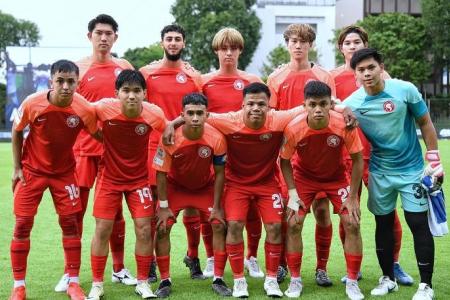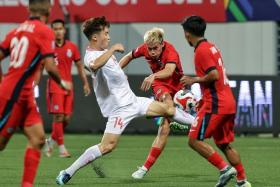Young Lions’ foreign players won’t hinder Singapore football development, say coaches
The Young Lions are playing in their 22nd season in the Singapore Premier League (SPL) and the pride are sporting a different look for the 2024-25 campaign.
Five foreign players make up the core of the team, alongside several local players who will be overaged for the next SEA Games in 2025.
While local football observers have questioned if the priorities have changed for the developmental side, Singapore national team coach Tsutomu Ogura and Young Lions coach Nazri Nasir told The Straits Times the primary focus is still developing youth footballers for the national team and other SPL clubs.
Ogura, who is the director of Singapore’s “A” & Under-22 teams, stressed that the Young Lions provide an opportunity for young players in Singapore, particularly for those in national service.
He said in an interview on May 23: “For us, Young Lions are very important for (local) player development and to develop young players for the U-22 and national team. We also want to develop a concept of play for the Young Lions that is same as the national team, so that it is easy for them to adapt when they (reach) the national team. This is the main target.”
Since their inception in 2002, the Young Lions have been a developmental side geared towards preparation for the biennial SEA Games. This season, they have included four Japanese players: Centre-back Jun Kobayashi, playmaker Kan Kobayashi – the 25-year-olds have been retained from the previous season – former Albirex Niigata central midfielder Kaisei Ogawa, 23, striker Itsuki Enomoto and Australian centre-back Rashid Hayek, who are 23 and 20 respectively.
However, Ogura and Nazri pointed out that the foreigners are not in the squad with a view towards naturalisation in the future. Instead, they have been recruited to beef up the competitiveness of the team.
The Young Lions finished bottom of the table in the last three seasons and in 2023, they managed only one win in 24 league matches and conceded a league-high 76 goals.
Nazri added: “With the foreigners there, the locals will push themselves... to the next level. I have told my players that everybody will get a chance to play. I am watching everyone’s training attitude. If you don’t step up, out you go, and this includes the foreigners. We have told the foreigners that we need them to guide the (local) players.”
While they have yet to register a point from two matches this season, losing 2-1 and 3-1 to Brunei DPMM and Lion City Sailors respectively, they were highly competitive in both encounters. After his side’s victory on May 18, Sailors coach Aleksandar Rankovic said: “I’m telling you, this team (Young Lions) are going to make a lot of problems for some other teams in our league.”
The new-look Young Lions have resulted in a more competitive league and could contribute to a stronger national team, but some members of the fraternity are worried about performances at the SEA Games.
Only U-22 players are allowed at the Games, which will rule out captain Farhan Zulkifli, Fathullah Rahmat and Nur Adam Abdullah for the 2025 edition. With all five foreigners deployed from the start against Sailors, the lack of playing time could become an issue, said observers.
In the wake of the Young Lions’ disastrous campaign at the last SEA Games in Cambodia, where they finished last in their group and were thrashed 7-0 by Malaysia, the Football Association of Singapore announced 10 key recommendations to work on. One of them was to increase playing minutes for key U-22 and U-23 footballers.
While young players can still compete in the SPL’s U-21 league – which the Young Lions play in as well – Geylang International coach Noor Ali noted that it is not competitive enough.
He said: “A lot of the locals eligible are not going to get competitive game time from now till the next Games. Playing in the U-21 league will not help them when they face the likes of Thailand, Malaysia and Indonesia at the SEA Games. Those teams are already at another level.
“I am worried for our younger generation of players.”
Noting that he cannot instruct SPL coaches to deploy more youth players as their focus should be on winning games, Ogura added: “This means that it is important that the U-21 league becomes more competitive. If they (young players) play in the SPL for a few minutes on the weekend, then they should play more during the week in the U-21 league. If we don’t have the U-21 league, then (I agree) there is a big problem.”
Get The New Paper on your phone with the free TNP app. Download from the Apple App Store or Google Play Store now


